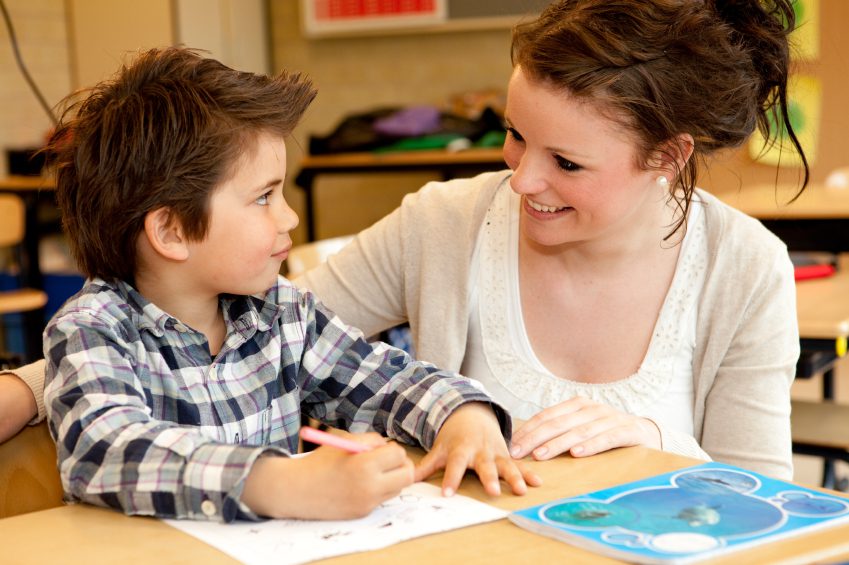Making The Most Of Your Parent-Teacher Conference

Posted in: Grade School, You & Your Family
Topics: Child + Adolescent Development, Learning + Attention Issues
Yep, it’s hard to believe that it’s that time of year again. Though it seems as if the school year has just started, you’ll soon receive an email or a notice from your child’s teacher asking you to sign up for the fall parent-teacher conferences. Some parents look forward to this meeting, feeling confident that they will hear praise about their child’s learning, behavior and social skills. But for a lot of us, there is a bit of fear and dread as we worry about what we might learn of our child’s academic challenges, misbehavior and/or social mishaps.
Regardless of where you stand on your child’s parent-teacher conference—looking forward it, wishing you could avoid it, or somewhere in between—try to see it as an opportunity to hear about your child’s learning, and to understand what life is like for him in this very separate world called ‘school.’
As professionals who work with children and families, we are used to hearing how differently kids present at home versus in school. Often, children will be on their best behavior in class, working hard to “keep it together” in front of their peers and teachers. But by the time they get home, having spent a lot of extra energy dealing with whatever stressors they face at school, they have to let off steam somehow. And, lucky us! Because we love them in good times and bad, parents tend to get the meltdowns, tears and tantrums. So, while it may seem that your child’s teacher is speaking about someone else’s kid during your conference, remember that it’s not that unusual to see a difference in behavior between home and school.
While you may want to allow your child’s teacher to continue to perceive him as an ‘angel,’ it will be important for you to share the fact that once he arrives at home, you see signs of school-related stress. Why shatter the myth?! Ultimately, whatever is causing your child to end his day in tears or locked in his room needs to be addressed as soon as possible, as the learning and social demands of school will only increase year to year.
Though all of us want to do our best, there are some who simply can’t pull it together in any situation. For some children, this will be the case even early on in school. Kids with sensory processing concerns don’t want to feel anxiety at recess or in gym class, but they do. Students with attention deficit disorders want to focus and sit still, but they can’t. And, children with learning differences would do anything to be able to read or do math like their friends, but without the right kind of support, they will end up feeling dumb. And, while we as parents should be able to assume that all teachers will be as observant and concerned as we are about our children’s emotional and educational progress, this is not always the case. Large class sizes, pressure to keep children off Ed plans and teacher burn-out are just a few of the reasons why it’s up to parents to advocate for their children—regardless of what teachers see and say.
This, then, brings us back to conference time, and how to make the most of it for your child. As you know her best, you should feel empowered going into this meeting with questions and concerns—should you have any. A few key things will help make this 30-minute meeting really count:
- Pre-conference observation. Even just a few days in advance of your parent-teacher conference, take time to watch your child as a ‘student.’ Take note of her attention span when having to do something she isn’t very interested in, or give her an instruction with two or three steps to see how well she can follow through (“Jane, please go upstairs to brush your hair and teeth, then grab your sneakers”). Think about your child’s ability to do homework on her own within a reasonable time—do you need to constantly remind her to ‘get back to work?’ Get a sense of how organized your child is as well, checking her backpack to see how messy (or neat) it is, looking at her room or workspace to see if things are scattered or missing, etc.
- Arrive with notes/questions. I know from my own experience at my children’s conferences that unless I have my thoughts in writing, I tend to forget to bring them up once the conversation with the teacher gets going. Most people find it useful to have a list of questions or concerns with them at any type of meeting in order to keep on track, and, given the time constraints of most parent-teacher conferences, this list can be very helpful in making the most of your discussion. And remember: There is no such thing as a stupid question! Don’t be worried that you’ll sound like a bad parent if you have to ask if your child should be reading by now, or if the frustration you see from your child when doing homework is something the teacher finds happening at school as well. This is the time to be open and honest about any thoughts you have in order to make the most of your child’s school experience.
- Listen and follow through. Just as important as sharing your concerns will be, listen to any that the teacher may have. While you may not agree with what is said, the fact that your child’s teacher is letting you know that something doesn’t seem to be going as well as it should be is BIG. Especially in public schools, there is notable pressure on teachers to handle concerns on their own rather than raise them with parents, as this then legally sets up the school system to have to do something about it. For example, if the teacher says to you that your child is reading below grade level, even with some extra help in class, you now have reason to start the evaluation process with the school system about possibly receiving special education services for your child. This translates into staff time and money from the school budget; so, the fact that the teacher reports any issue to you as a possible problem/weakness/concern—be it learning, social, or behavioral—means that you need to follow up with the school’s special education coordinator (whether you see the concerns yourself or not). There is no harm in pursuing a better understanding of your child’s learning or behavior! Only good will come from finding out more information, and getting your child the help he may need to make the most of school and life.
Finally, you should also know that by middle school, regularly-scheduled parent-teacher conferences often stop. It will be up to you in most cases to call a meeting at any point in the school year to raise concerns, discuss your child’s progress and find out what you can do to help if there are any issues. Even in pre-school and elementary school, parents have the right to convene a conference with their child’s teacher or any other school staff at any time, not just when routinely scheduled. Emailing or putting concerns into writing is also an effective way to communicate without necessarily holding a formal meeting, but the job falls to us as parents to advocate for our kids—even at the best schools with the best teachers.
Yep, it’s that time of year again. Good luck!
Was this post helpful?
Newsletter
Subscribe Today
Your monthly dose of the latest mental health tips and advice from the expert team at The Clay Center.
SubscribeMultimedia
Quick Jumps
Tag Cloud
-
addiction
ADHD
adolescents
anorexia
anxiety
autism
behavior
CBT
child development
children
college
communication
covid-19
depression
digital media
dyslexia
eating disorder
evaluation
family
fear
healthy development
learning
learning disabilities
learning disability
mental health
mental illness
parenting
parents
Podcast
PTSD
relationships
resilience
school
shrinking it down
social media
stigma
stress
suicide
technology
teenagers
teens
therapy
trauma
treatment
violence

 Share
Share Tweet
Tweet





